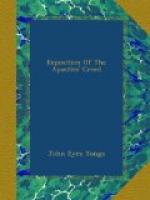Examination of ancient heathen religions and of the views they set forth regarding God shows clearly the distance at which they stand from the revelation of Scripture. The gods of the heathen were of like passions with their worshippers—selfish, cruel, vindictive, and without regard for equity or justice in their treatment of men. The God of the Bible, on the other hand, is a righteous God, merciful to His creatures, and desirous of their temporal and eternal wellbeing, and when He inflicts suffering it is not as a passionate Judge, but as a Father who chastens His children for their profit.
The doctrine of the Trinity of Persons in the God-head, though not expressly stared in the Creed, is implied in the clauses which refer to each of the Persons who compose it. There is one God, but in the Godhead there are three Persons, the Father, the Son, and the Holy Ghost, whose names indicate the relation in which each stands to the others.
Each of the Persons is complete and perfect God. While there are three Persons in the Godhead, the same in substance, equal in power and glory, these three are one. The doctrine thus stated is termed the doctrine of the Trinity. This word is not found in Scripture, but the truth which it expresses is set forth there, dimly in the Old Testament, distinctly in the New. In the first chapter of Genesis the word “God” is in the Hebrew a plural noun, and yet it is used with a singular verb, thus early seeming to intimate what afterwards is clearly made known, that there is a plurality of Persons, who yet constitute the one living and true God. The same indication of plurality in unity appears in the account of man’s creation: “Let us make man."[019] This doctrine of the Trinity is essentially one of revelation. Natural religion testifies to the existence, the personality, and the unity of God, but fails to make known that the unity of God is a unity of three Persons. The doctrine does not contradict reason, it is above reason.
It is sometimes said that the doctrine of the Trinity involves a contradiction in affirming that three Persons are one Person. This charge misrepresents the doctrine. Trinitarians do not say that Father, Son, and Holy Ghost are three Persons in the sense in which three men are three individuals. They believe that there is one God, and that Father, Son, and Holy Ghost are yet so distinct that the Father can address the Son, the Son can address the Father, and the Father can address and send the Spirit. God’s ways are not as our ways. He is not a man that He should be limited by the conditions of human relationships. When we say there are three Persons in the Godhead, we use a word applicable to men, which, though the most fitting one at our disposal, must come far short of fully describing the relations of Father, Son, and Holy Ghost to each other. Possessing no celestial language, we cannot fully describe or understand heavenly things.




